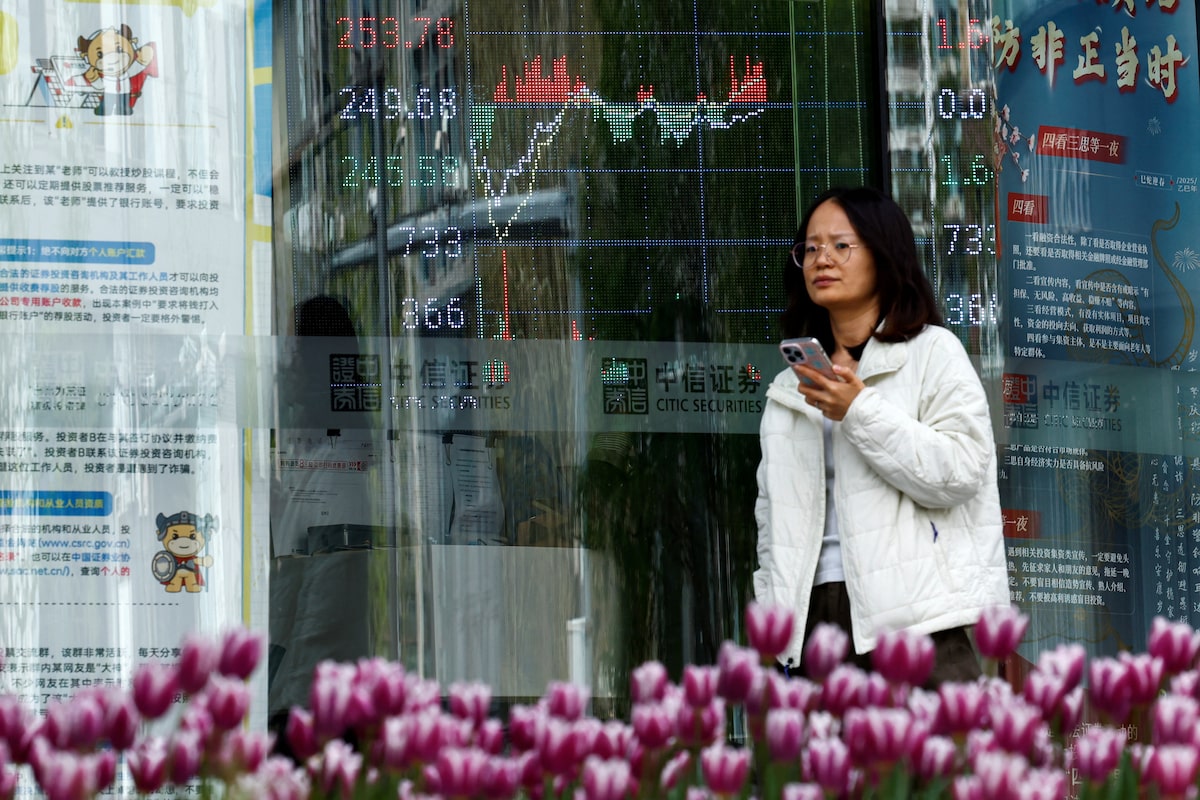



A woman walks past a brokerage house with a display board showing the stock index information, in Beijing, China April 9, 2025.Tingshu Wang/Reuters
China is showing no signs of backing down from an escalating trade war with the United States, as new tariffs championed by President Donald Trump came into force Wednesday against almost all of Washington’s major trading partners.
Speaking at a government forum in Beijing, Chinese President Xi Jinping called for greater regional co-operation and emphasized China’s diplomatic and trade ties with its neighbours, as state media unleashed a barrage of criticism against the U.S.
“Our country’s relations with its neighbours are currently at their best since modern times,” Mr. Xi said, calling for the “strengthening of industrial and supply chain co-operation.”
While he did not directly reference the U.S., Mr. Xi’s remarks – reported by state media hours after Mr. Trump’s tariffs, including a new 104-per-cent levy on Chinese exports, went into force – come as Beijing is positioning itself as a rational, pro-globalization alternative to an increasingly unpredictable Washington.
In an editorial Wednesday, the official Xinhua News Agency said Mr. Trump’s latest escalation “reeks of desperation.”
“If Washington believes that ramping up pressure can compel Beijing to give in, it is engaging in wishful thinking,” the editorial said. “The United States is far from immune to the economic wounds of the trade war it has ignited. American markets are already feeling the strain, businesses face growing uncertainties, and the risk of recession is ballooning.”
Markets in China were alone in Asia in not suffering further losses Wednesday, after state funds intervened to prop them up.
On Chinese social media, users mocked the U.S. with popular hashtags including “America is fighting a trade war while begging for eggs,” but there were also signs of sensitivity around discussions of the potential ramifications for China’s fragile economy, with some posts referencing the new 104-per-cent tariffs censored.
China has been preparing for a renewed trade war since Mr. Trump took office, after he repeatedly threatened 60 per cent tariffs on Chinese goods during his election campaign. While things have escalated faster than expected, Beijing has so far called Washington’s bluff, arguing that the U.S. will feel the most pain, given how reliant many companies are on Chinese goods and manufacturing, much of which cannot be readily moved to the U.S.
There was anger in China this week – and widespread criticism elsewhere – when U.S. Vice-President J.D. Vance described Chinese workers as “peasants,” a remark Beijing said was “ignorant and disrespectful.”
Mr. Trump has suggested products such as Apple’s iPhone could be made in the U.S., contradicting the company’s chief executive, who said as far back as 2017 that China had “stopped being the low-labour-cost country many years ago,” and that Apple’s primary reason for focusing manufacturing there was access to workers skilled in advanced tooling and precision engineering.
Also on Wednesday, China’s Ministry of Commerce released a new white paper on “U.S. Trade and Economic Ties,” which reiterated Beijing’s willingness to take countermeasures in the face of “economic bullying.” This could include, state media has reported, a ban on U.S. poultry exports, suspending co-operation on fentanyl, restricting U.S. firms engaged in procurement or legal services in China, banning Hollywood films, and investigating U.S. companies for alleged intellectual property abuse.
Writing as Mr. Trump’s latest tariffs came into force, veteran China watcher Bill Bishop said he did not remember “ever being this pessimistic about the trajectory of U.S.-China relations.”
“Even if there is a negotiated, tactical retreat, significant damage has been done and the belief on the Chinese side that the U.S. is trying to ‘contain and suppress’ China will have been further reinforced,” Mr. Bishop said in his newsletter Sinocism. “The trade relationship is the linchpin between the two countries, and as it breaks we should probably expect other areas to see more stress.”
This could affect Washington’s ability to contain Chinese designs toward Taiwan, and already a united front against China built up by Mr. Trump’s predecessor Joe Biden is rapidly falling apart as the European Union, Japan and South Korea have all shown greater willingness to work with Beijing as a result of worsening ties with the U.S.
On Tuesday, Chinese Premier Li Qiang held a call with European Commission President Ursula von der Leyen, during which she “stressed the responsibility of Europe and China, as two of the world’s largest markets, to support a strong reformed trading system, free, fair and founded on a level playing field.”
A high-profile Australian billionaire is set to face trial accused of illegal lottery activity over…
A high-profile Australian billionaire is set to face trial accused of illegal lottery activity over…
TORONTO — Canadian country singer Robert Adam recorded their new album in Nashville, but under…
TORONTO — Canadian country singer Robert Adam recorded their new album in Nashville, but under…
TORONTO — Canadian country singer Robert Adam recorded their new album in Nashville, but under…
TORONTO — Canadian country singer Robert Adam recorded their new album in Nashville, but under…